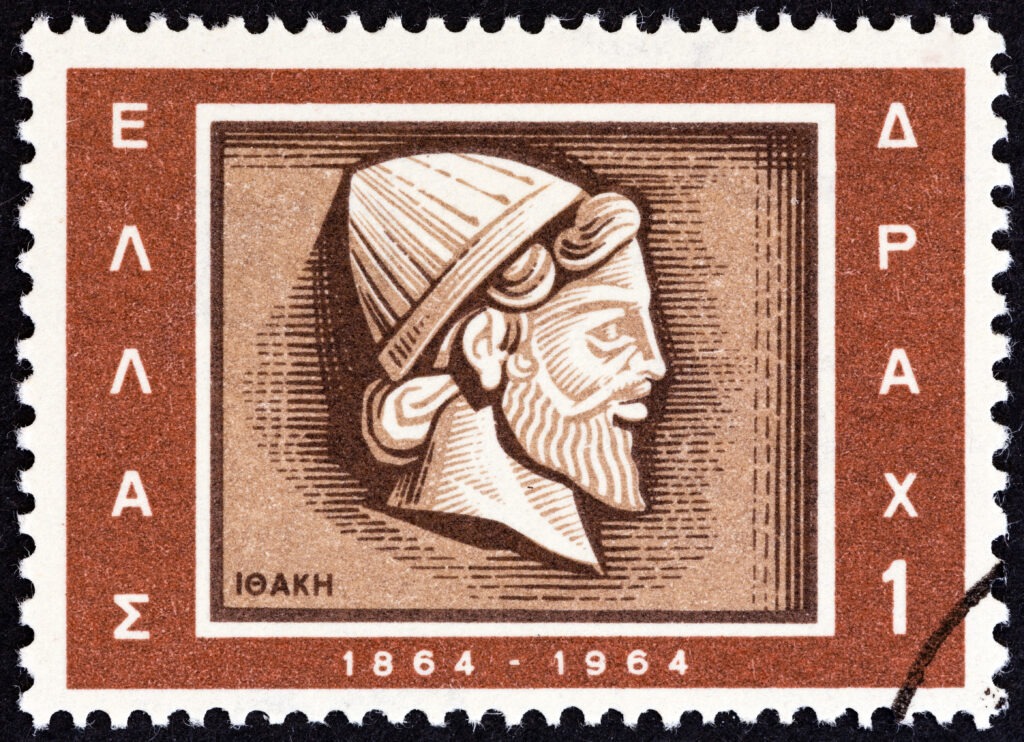Sometimes I hear people say about our school, “I wish I had that sort of education growing up.” If you ever feel that way, be assured that while you can’t go back in time, you can still read along with us some of the books you might have missed. I would encourage you to start with the Odyssey.
The Odyssey is an epic poem attributed to Homer, dated from around 700 BC. Homer presents the adventures of Odysseus as he takes ten years to return home after ten years of fighting in the Trojan War (which itself receives epic treatment in Homer’s Iliad).
The opening section of the poem narrates the coming-of-age of Odysseus’s son, Telemachos, who has grown up for twenty years without a father. The goddess Athena, disguised as a visiting guest, tells Telemachos, “You should not go on clinging to your childhood. You are no longer of an age to do that.” This section rings true for our students who are on the brink of adulthood. Later, Athena appears again as a man named Mentor (from whom we get the English word). Not only does Mentor encourage Telemachos to make a journey to find news of his father, but he accompanies him on the first leg of it.

Students read Homer’s Iliad, the epic poem that precedes the Odyssey.
Next, we see Odysseus’s own adventures as he returns from the war. These adventures can be read on many different levels—not only for the excitement of how he survives dangerous situations, but also in terms of what those challenges represent. As an example of how modern readers can find meaning in the Odyssey, psychiatrist Jonathan Shay’s 2002 book Odysseus in America: Combat Trauma and the Trials of Homecoming details how Odysseus’s homecoming journey anticipates many of the struggles Vietnam veterans faced upon their return from the war.
While the title, Odyssey, has become a word in English meaning “a long journey,” there is much more to the poem than the journeys of Telemachos and Odysseus. Homer’s poems have been treasured for thousands of years because of his wisdom about the human condition. The poem offers insights about suffering, leadership, hospitality, and family dynamics. Reading the Odyssey through a Christian lens, we find helpful illustrations of temptation and sin. In a recent sermon at my church, our pastor alluded to the Sirens to illustrate the challenge of self-control in the Christian life. In fact, we can draw parallels between the challenges Odysseus faces and our struggles with depression, addiction, sexual sin, and foolish pride.

Stamp showing the profile of Odysseus
The second half of the poem shows Odysseus’s return to his homeland of Ithaca after twenty years. Odysseus cannot walk right into his home for a joyful reunion with his family, because there are over a hundred suitors eating and drinking there. The suitors would prefer Odysseus to be dead so that one of them may marry his wise and beautiful wife, Penelope, and take control of his wealth. Therefore, Odysseus returns disguised as a beggar and has a chance to test his servants to see who has been loyal and who has been helping the suitors. With the aid of Telemachos and a few faithful servants, Odysseus restores order in his household. The poem culminates with Odysseus’s reunion with his faithful wife and then with his father, Laertes.
The Odyssey is a pleasure to read. All along the way, Odysseus spins delightful tales; he can think and talk himself out of many difficult situations. Still, despite his intellectual and rhetorical gifts, Odysseus is a deeply flawed man: he fails as a leader by losing every single one of the men on the twelve ships he took to the Trojan War, and he falls short of being the ideal husband by committing adultery. At one point, Odysseus’s men have to remind him to leave Circe’s island and resume the journey home!
Still, the Odyssey presents Odysseus as a hero. We may think about how the ancient Greeks longed for someone to set things right in this broken world. Is it too far-fetched to interpret Odysseus as a picture of our Redeemer, Jesus Christ, coming to claim the Church as His bride?
A brief overview cannot do justice to all the riches of the Odyssey, but I encourage you to read it for yourself and get a taste of the education we are enjoying at Delaware Valley Classical School.
Schedule a visit to learn more about DVCS.



